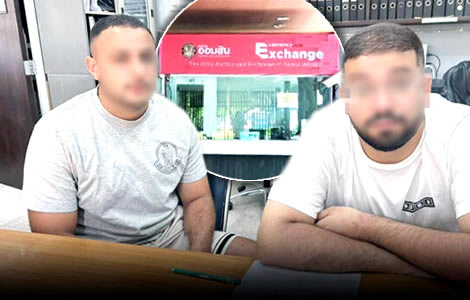Police in Southern Thailand have raised the alarm after three Israeli tourists were caught exchanging counterfeit US dollars on Koh Samui and Koh Phangan, exposing serious vulnerabilities at foreign exchange booths and prompting an immediate crackdown.
Police in Southern Thailand are sounding the alarm after three Israelis were caught exchanging counterfeit US dollars on Koh Samui and Koh Phangan. The fake notes slipped through outdated security software, exposing serious gaps in exchange booth defences. The arrests follow a Yemeni man and an accomplice who recently defrauded six booths of ฿1.15 million. Police warn fraudsters are exploiting weak systems and are cracking down with zero tolerance, urging banks and tourists to stay alert in order to prevent further losses and stop criminal exploits.

Two Israeli nationals were arrested on Koh Samui last week for exchanging counterfeit US dollars, exposing major flaws in bank security systems.
Mr. Matan, 25, and Mr. Omer, 27, were detained on October 11 by Bo Phut Police officers and Surat Thani Immigration officials. Their arrests followed warrants issued by Koh Samui Provincial Court. Both men face charges of counterfeiting foreign banknotes and possessing them for circulation. Authorities report that they successfully exchanged $750 in fake $50 bills for ฿21,840.
The scam began at the Government Savings Bank exchange booth at Samui Airport on October 6. Matan first exchanged five counterfeit $50 bills, worth $250, for ฿7,280. Meanwhile, Omer exchanged ten fake $50 bills, totalling $500, for ฿14,560. Surprisingly, the booth’s detection machine failed to flag the notes. Consequently, both transactions went through undetected.
Failures in Samui airport exchange booths allowed $750 in fake notes to pass detection systems unnoticed
The fraud was only discovered three days later. On October 9, the Central Samui branch manager notified police after detecting 15 counterfeit $50 bills. The bank’s headquarters had to conduct a detailed examination to confirm the fraud. As a result, authorities realised the airport booth’s software had failed to detect the fake currency.
Bank officials revealed that outdated detection software allowed the bills to pass undetected. Because the program had not been updated, it could not identify counterfeit notes. Therefore, the exchange transactions proceeded unchecked, highlighting critical vulnerabilities in the system.
Police used CCTV footage, exchange records, and immigration data to track down and arrest both suspects. The operation demonstrates how technology and coordination are essential in modern law enforcement. Furthermore, it brings home the risks posed by lax security protocols at high-traffic tourist locations.
The arrests follow a similar case on nearby Koh Phangan. On October 7, tourist police detained Mrs. Ayele, a 49-year-old Israeli woman, who exchanged a fake $100 bill for ฿3,140. She attempted to flee immediately after the transaction.
Israeli woman caught on Koh Phangan after trying to spend counterfeit $100 bill at a local exchange booth
However, authorities tracked her using the national BIOMETRICS system and arrested her at her accommodation. She admitted to knowingly bringing counterfeit bills from New York to spend in Thailand.
These consecutive incidents have raised serious concerns about currency security in southern Thailand. Tourist hotspots, including Koh Samui and Koh Phangan, remain vulnerable to fraud due to outdated detection systems and insufficient oversight. Therefore, authorities are calling for stricter monitoring and updated software across all exchange points.
While the sums involved appear small, officials stress that even minor fraud can have major economic consequences. Counterfeit currency undermines confidence in local banks and damages the tourism industry. As a result, the government has promised a comprehensive review of security measures at all major tourist locations.
Authorities warn that bank staff must remain vigilant when handling foreign currency. Consequently, the Government Savings Bank is retraining its exchange booth employees to manually detect counterfeit notes. Additionally, all Samui Airport exchange booths will undergo immediate software upgrades to prevent further incidents.
Police urge training and software upgrades to prevent further counterfeit transactions at Samui Airport
The cases also highlight the growing role of technology in policing financial crimes. CCTV, immigration records, and biometric systems were instrumental in capturing the suspects. Meanwhile, bank records and transaction logs helped authorities reconstruct the scam. These tools, authorities say, are critical to preventing future fraudulent activity in high-traffic tourist areas.
Experts note that the fraud in Samui and Phangan are likely not isolated. Criminal networks often target popular tourist islands where detection systems are weakest. Consequently, police are investigating whether the suspects acted alone or as part of a larger counterfeit operation.
Tourism officials warn that repeated incidents could damage visitor confidence. “Protecting the integrity of currency exchanges is essential for tourist trust,” one official said. Therefore, authorities encourage both tourists and businesses to scrutinise foreign banknotes carefully.
Authorities urge vigilance and immediate reporting to prevent further circulation of counterfeit currency
Authorities have urged anyone handling suspicious bills to report them immediately. Rapid reporting and coordinated action are essential to prevent the spread of counterfeit currency. Furthermore, timely intervention can help law enforcement identify networks before they grow.
The arrests of Matan, Omer, and Mrs. Ayele highlight the ongoing threat of counterfeit currency in Thailand. Officials stress that updated technology and vigilant staff are essential to safeguard both the financial system and tourists. Meanwhile, the government is reviewing additional measures, including more frequent software updates and tighter scrutiny of all foreign currency transactions.
These events serve as a stark warning: even experienced tourists and reputable banks can be targets of sophisticated scams. Therefore, vigilance, updated systems, and cooperation between banks and law enforcement remain crucial. Authorities say that failing to address these vulnerabilities could encourage further attempts at fraud.
Multi-layered security approach planned to deter counterfeiters on Koh Samui and surrounding islands
As investigations continue, officials are emphasising a multi-layered approach. Staff training, software updates, surveillance, and biometric monitoring all play vital roles in deterring counterfeiters. Consequently, Koh Samui and surrounding islands are expected to see increased scrutiny in the coming months.
Officials on Koh Phangan launch inquiry after locals complain the island is becoming a second Tel Aviv
Yemeni conman arrested by police after getting his hands on ฿1.15milion through foreign exhange scam
The arrests send a clear message: counterfeiting will not be tolerated, and authorities are capable of detecting even sophisticated scams. Meanwhile, the public is advised to remain alert, and banks are urged to modernise detection systems immediately.
The alert for southern provinces comes just a week after a Yemeni national managed to hit six different foreign exchange booths over a one-day period last week for ฿1.15 million. Mohammed Yahya Zaid and an accomplice were arrested last week for the exploits from September 29th to October 7th.
Join the Thai News forum, follow Thai Examiner on Facebook here
Receive all our stories as they come out on Telegram here
Follow Thai Examiner here
Further reading:
Body of crazed German man who refused to take his meds but instead smoked cannabis, found at home


















